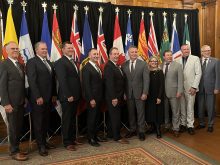Rosann Wowchuk is calling on the Manitoba government to revive a service she says doesn’t cost much but could help farmers get through rough financial times.
The farm and rural stress line hung up for the last time several years ago, but the NDP agriculture critic wants the government to reconnect it.
It will be one of Wowchuk’s top priorities when next week Manitoba’s legislature begins what is likely its last session before dissolving for a provincial election.
Wowchuk recently held meetings around the province with members of Keystone Agricultural Producers, the National Farmers’ Union and Manitoba Women’s Institute.
Read Also

Canola support gets mixed response
A series of canola industry support measures announced by the federal government are being met with mixed reviews.
She wanted to find out first-hand what effect low farm income is having on the rural economy, and said about 400 people came to discuss a range of issues, from safety nets to education.
Everyone agrees on the stress line, said Wowchuk. At a cost of $80,000 per year, it is something the government could immediately do to help farmers.
“I don’t think that’s an overbearing cost,” said Wowchuk.
Some farmers may not plant crops this year because they can’t afford to, she said. The farm stress line may help some people who are going through hard times.
Wowchuk developed 10 recommendations from the meetings:
- Reject the Estey Report.
- Develop long-term safety net programs.
- Make it easier for rural students to access post-secondary education.
- Fund public, independent research, especially in organic crops.
- Take a strong stand at the next round of world trade talks.
- Demand retailers and processors make prices more transparent.
Wowchuk acknowledged many of the recommended changes won’t happen overnight, but she’s hopeful governments will take heed.
“I’m not a pessimist, I’m optimistic that there are a lot of good ideas out there and there’s a lot of hope coming from the producers that governments will listen to them.”














